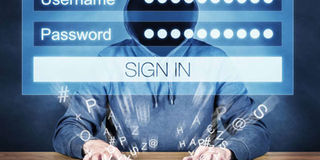How to protect yourself from crooks

Mobile devices, especially smart phones and tablets, have become very attractive to hackers. PHOTO | CHARLES KAMAU | NATION MEDIA GROUP
What you need to know:
- Criminals have become increasingly skilful in their attempts to create fake emails that look like they are from someone or some place you know.
- Always protect your phone with a strong password or biometric system such as finger or facial scanning feature if available. Biometric security is stronger compared to just a PIN.
- Hackers can gain access to your webcam on your laptop and use some software such as Remote Administration Tool to record embarrassing footage of you.
It is hard to imagine that the world has 7.5 billion people. About 6.5 billion of them own a phone and only 4.5 billion have access to toilets. This shows just how important tech devices are in people’s lives.
Digital devices connect us to a meshwork of other devices and people, and in the process share a lot of information about us.
No one with a phone or laptop is immune. We are all in. We share information both knowingly and unwillingly.
This labyrinth of connections is also a fine playground for unscrupulous characters who thrive on crafting new tricks to infiltrate our digital lives.
When they succeed — and they often do — they empty bank accounts. Others are perverts on the prowl with wicked schemes, and yet others are stalkers and identity thieves waiting for the opportune time to pounce on the treasure trove that is your digital information.
Unfortunately, it is difficult to disconnect our digital lives from our off-line lives. Our digital and physical lives are so intricately intertwined that, by tracking our digital footprints, it is easy to construct our day-to-day lives.
CYBER ASSAULT
Here are a few tips that can insulate you from cyber-assault: Keep off freebies: Many people scavenge for free wifi in malls, restaurants and pubs. Unprotected wifis — those that you don’t need a password to login — are the number one target by hackers. There is nearly no way of telling if a hacker is lurking on a wifi until it is too late. To be on the safe side, only connect to wifis that are password-protected. You can spot them because they have a lock icon next to their name.
Watch out for phishing: Phishing is an attempt to obtain sensitive information by sending emails that look like they are coming from a trustworthy source. Criminals have become increasingly skilful in their attempts to create fake emails that look like they are from someone or some place you know. If you click the link on the email, your device could get compromised.
Trust your gut feeling; if after clicking the link you are asked to sign up and give personal information, know that you are getting yourself inside a dark hole.
Install anti-virus: To insulate yourself against online attacks, make sure that your devices, including your phone and tablets, have up-to-date anti-virus software.
STRONG PASSWORD
Lock with a strong password: Always protect your phone with a strong password or biometric system such as finger or facial scanning feature if available. Biometric security is stronger compared to just a PIN. In addition, whether you are using your phone, tablet or laptop to access your emails, electronic banking or social media, use strong passwords and always remember to log out when done.
Back up daily: Losing your computer or phone is bad enough but losing your digital wealth can be devastating. Google offers multiple ways for cloud storage such as Google Drive and Google Photos.
You can also buy an external drive and use it to back up your files. Never keep the external hard-drive together with your computer so that, if you lose one, you can restore your files from the other.
Webcam warning: Hackers can gain access to your webcam on your laptop and use some software such as Remote Administration Tool to record embarrassing footage of you. Therefore, it is important to cover your laptop’s camera with tape when your laptop is on.
Surf safe: When you are on the internet, stick to websites that have “HTTPS” on their web address. These are secure and less likely to expose your information to bad guys.
By using these tips, you could save yourself and your family from the agony caused by cyber-crooks.
The writer is an informatics specialist. [email protected] @samwambugu2





